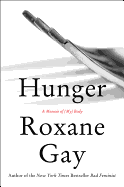
Roxane Gay (Bad Feminist) has tackled issues of race, gender and class head-on with intelligence and unabashed insight. In Hunger, Gay turns the lens inward on her lengthy battle with body image and weight loss, reflecting on the hypocrisies underlying modern notions of beauty and femininity.
A violent rape at the age of 12 propels Gay into a 30-year psychological battle in which she turns to her appetite to stop the hurt and "fill the gaping wound of me, or to try to fill the gaping wound of me." Food became a source of safety for her. In this memoir, Gay uses her experiences to draw out the fallacies of unrealistic demands society places upon women to occupy a smaller space. Behind the deceptively simple passages lies a minefield of emotional pain and longing, whose revelation exposes uncomfortable truths about the destructive patterns that push women to embrace unhealthy behaviors.
"Fat, much like skin color, is something you cannot hide, no matter how dark the clothing you wear, or how diligently you avoid horizontal stripes," she writes. "And then I think about how f***ed up it is to promote this idea that our truest selves are thin women hiding in our fat bodies like imposters, usurpers, illegitimates."
At its rawest, Hunger addresses the dreams and desires, the hopes and fears, and the actualities of living in an overweight body, "hungering for what I cannot have, or perhaps wanting what I dare not allow myself to have."
Gay's journey ends not with the silver linings promised by reality television, but with uncertainty, the unknown and a quiet confidence despite the brutality of her past. Hunger is a work of exceptional courage by a writer of exceptional talent. --Nancy Powell, freelance writer and technical consultant

